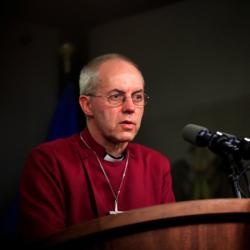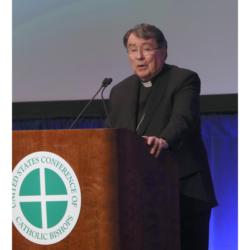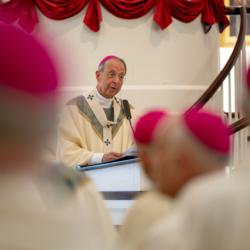The serendipity of Ordinary Time
I miss landlines.
Certainly, I like the convenience of being able to reach friends and family quickly and appreciate being able to receive phone calls away from home or office. Truly, I am grateful for the connectedness easily taken for granted when a pocket-sized phone has become a constant companion.
Yet, what I miss about the landline is the opportunity it gave me -- and all of us -- to speak to those we were not intending to call. Growing up, when anyone called our family home on the rotary phone mounted to the wall in our kitchen, I was likely to be the one who answered the phone. My enthusiasm for the telephone started young!
Some of the phone calls were for me, and I chatted with my friends at the kitchen table with all the lack of privacy and easy access to fresh baked cookies that entailed.
Most of the calls, though, were not for me. Yet, when I answered these calls, I met and got to know so many others with whom I otherwise would not have spoken. When my dad's clients called for him and I took their messages, I learned a little bit about my dad as a businessman. When friends called for my brother or sister, I spoke with many I previously knew only by name and, perhaps, never would have known except for the times that they called our shared telephone. When relatives called for my parents and got me on the line instead, we had conversations that I remember to this day. Memories of those conversations are treasured more now as older generations of my family pass from this life. When my mother's friends were seeking her, I spoke with them in conversations that grew longer as I grew older. With time, I came to count her friends as my own.
Likewise, when I called my friends at their homes, I was just as likely to reach their parents, siblings, or grandparents as I was to reach them. In doing so, I again met others that I otherwise would never have known.
Certainly, this was not always efficient or convenient. My father's clients who took the time to call him at home likely had something important to discuss. They may not have appreciated chatting with an 11-year-old. Friends who wanted to speak with my parents or siblings may have had limited time. As a teenager calling my own friends, I might have thought that extended chats with parents who answered their phones were merely inconvenient speed bumps on the way to the conversations I really wanted to have.
Now, though, I miss those unplanned conversations. When I call someone on a cellphone today, I am fairly certain I will reach the person I intend to call -- or his or her voicemail. I no longer expect that person's spouse, children, or parents to answer the phone. There is some loss in that.
I wonder, sometimes, how many friendships were made, how many romances began, and how many cherished relationships were born through what seemed to be accidental encounters but were, in fact, true blessings. I wonder, sometimes, what we are missing as we seek greater efficiency. We can now more easily reach only those we wish to speak to without the blessed messiness of conversations with those who might otherwise remain strangers.
I appreciate order, predictability and, yes, control of those things I can manage. Yet even I wonder what we surrender when we lose those unsought opportunities to engage with those who are not in our direct paths. The loss of the landline is but one small example of the ways in which, perhaps, we may miss some of the opportunities God gives us to expand the circle of those whose lives could and should intertwine with ours. There are other examples too -- perhaps examples that may be more obvious to those younger than I who did not grow up with the joys and frustrations of a family landline.
Technology has, does, and always will bring changes to our lives -- both good and bad. But, in the lowly landline is a reminder that there are blessings to be found in preserving the unexpected serendipity of ordinary time.
- Lucia A. Silecchia is Professor of Law and Associate Dean for Faculty Research at the Catholic University of America's Columbus School of Law.



















